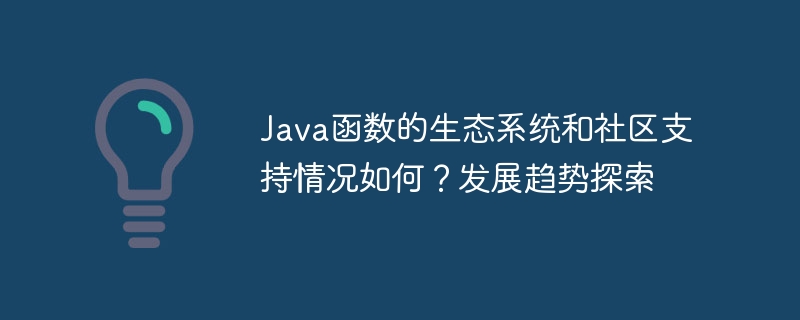
Java functions have a rich function library, including JCF, Apache Commons and Guava. Supported by an active community, including StackOverflow and GitHub. Trends like functional programming, microservices, and serverless computing are driving the ecosystem. Practical cases demonstrate common functions such as string concatenation, splitting, and replacement.

Ecosystem and community support for Java functions
Introduction
Java as a popular programming language with a large and active community. This article will explore the ecosystem and community support for Java functions and analyze its development trends.
Rich function library
Java function library provides a wide range of functions, including data processing, string operations, collection management and I/O. The most popular function libraries include:
Active Community
The Java Functions community is very active, with numerous forums, online resources, and developer tools available. Platforms like StackOverflow and GitHub provide convenient places for developers to seek help, share knowledge, and collaborate.
Development Trends
The Java function ecosystem is constantly evolving, and here are some key trends:
Practical Case
Let us illustrate the application of Java functions in the real world through a practical case:
import java.util.Arrays;
import java.util.List;
public class StringFunctions {
public static void main(String[] args) {
List<String> names = Arrays.asList("Alice", "Bob", "Carol", "Dave");
// 字符串连接
String concatenatedNames = String.join(", ", names);
System.out.println(concatenatedNames); // 输出:Alice, Bob, Carol, Dave
// 字符串拆分
String[] splitNames = concatenatedNames.split(", ");
System.out.println(Arrays.toString(splitNames)); // 输出:[Alice, Bob, Carol, Dave]
// 字符串替换
String replacedString = concatenatedNames.replace("Carol", "Charlene");
System.out.println(replacedString); // 输出:Alice, Bob, Charlene, Dave
}
}In this example, we Use the Java collections framework and string function library to manipulate lists of strings. We demonstrated string concatenation, splitting, and substitution, which are common tasks in the Java function ecosystem.
Conclusion
With an active ecosystem and extensive library support, the Java Functions community provides developers with everything they need to build robust, maintainable, and efficient applications. As functional programming, microservices, and serverless computing advance, we expect the Java Functions ecosystem to continue to grow and evolve.
The above is the detailed content of How is the ecosystem and community support for Java functions? Development trend exploration. For more information, please follow other related articles on the PHP Chinese website!
